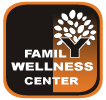"We offer group-based intensive treatment programs in a safe, supportive environment designed to help clients change their attitude and behaviors to enrich their lifestyle"
Family Wellness’ interdisciplinary treatment team provides all core treatment components. These components are the basis for all of Family Wellness Center’s Recovery Programs.
In addition, each Recovery Program stream — Substance Addiction, other addictions, and Codependency Disorders — has additional components that are detailed in the sections that follow.
Programs are further customized to suit the individual client, his or her family members and, if applicable, the employer. If treatment by a medical specialist is required, Family Wellness Center has an extensive network in place for supplemental assessment and treatment.
Core Treatment Components
The following are the core treatment components in all of Family Wellness' Recovery Programs
Our Programs
Substance Abuse Recovery
The Family Wellness Center Programs are structured programs for Dependents and Codependent families. The Programs are characterized as holistic and stresses the importance of each family member's role in creating functional families.
Gambling Treatment Services
Studies show that about one-third of people with chemical dependencies are cross-addicted to gambling. Since issues related to the treatment of a gambling problem parallel those of a chemical dependency the recovery strategies are similar - helping clients identify the ways they gamble, why they gamble, their gambling triggers, and the consequences of their gambling.
Continuing Care and Aftercare
This 90-day program is developed for each client before leaving the Intensive Outpatient Program although it is optional. These plans might include ongoing counseling, participation in AA or NA meetings, transition groups, alumni contacts, and other Twelve Step support groups, or taking additional steps to advance education or career. Clients are also encouraged to participate in services available at the Center, which includes ongoing contact with clinical staff, lectures, workshops, reading materials and participation in the Family Program.
Family Program and Services
Studies show that about one-third of people with chemical dependencies are cross-addicted to gambling. Since issues related to the treatment of a gambling problem parallel those of a chemical dependency the recovery strategies are similar - helping clients identify the ways they gamble, why they gamble, their gambling triggers, and the consequences of their gambling.
Corporate and Education Services
An increasing number of Philippine companies are developing comprehensive alcohol and drug policies. This trend is driven by consideration for the safety of employees and the public, as well as legal liabilities and responsibilities.
